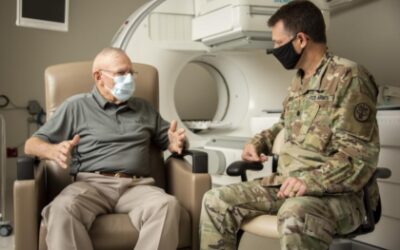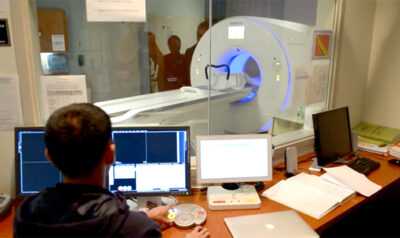Environmental heat can adversely affect health, resulting in heightened healthcare demands, disability and even mortality. The combination of particular medical conditions with the ongoing global temperature increase may exacerbate susceptibility to heat-related ailments.
New Journal Article Decries Lack of Recognition for Military Medicine;
A new Special Communication in JAMA Network Open decried that military medicine’s contribution to healthcare advances often are overlooked and that not enough communication occurs between civilian and military clinicians.
Sarah Krein Researches Whatever Is Necessary to Improve Veterans’ Care
Most VA researchers begin their research career because of a fascination with a certain clinical subject–a niche area usually discovered early in their studies that starts them off on a long, relatively straight, journey. Not for Sarah Krein, PhD, RN, who is interested in many subjects but none so deeply as the methodology of research itself.
Thrombosis Risk With Cancer Treatment Varies With VA Patient Characteristics
PORTLAND, OR -- Has cancer-directed therapy changed patterns of the incidence and risk of cancer-associated thrombosis (CAT) at the VA? That was the question raised in a cohort study of 434,203 veterans with solid tumors and hematologic neoplasms within the VHA....
Significant Increase in Celiac Disease Found in Military Population
The incidence and prevalence of celiac disease increased significantly in the U.S.
Surprises in Patterns of Healthcare Use Among Urban AIAN Population
While healthcare access and use is a subject of national concern and considerable study, such studies often have failed to capture of subtleties of the healthcare experience of the American Indian and Alaskan Native (AIAN) population.
Impaired Mitochondrial Function, Not Inflammation, Appears to Be Cause of GWI
Future clinical interventions for Gulf War Illness should focus on impaired mitochondrial function, not inflammation, according to a new study.
Statins Play a Role in Type 2 Diabetes Progression to Insulin Use
In patients with Type 2 diabetes mellitus, cardiorespiratory fitness and body mass index (BMI) play a role in statin-related progression to insulin therapy, according to a recent study.
Dermatology Group Seeks Better Stevens-Johnson Severity Tool
Stevens-Johnson syndrome/toxic epidermal necrolysis (EN) is a severe adverse mucocutaneous drug reaction with life-threatening implications, usually caused by drug reactions.
How Lung Volumes Change During Progression of Spirometric COPD
Abnormal lung volumes representing air-trapping identify the subset of smokers with preserved spirometry who develop spirometric chronic obstructive pulmonary disease (COPD) and adverse outcomes can be identified by abnormal lung volumes representing air-trapping.
VA Doctor-Turned-Inventor Works to Prevent Infectious Disease Spread
Part of the inspiration for Chetan Jinadatha, MD, MPH, to specialize in treating infectious disease comes from going to medical school in his native India, which has a high burden of such diseases. However, he also likes to say it’s partly for selfish reasons.
VA Researchers Find Biomarkers for Potentially Serious Parasitic Infections
Asymptomatic Leishmaniasis Infected Nearly 20% of Soldiers in Iraq BETHESDA, MD—New research has identified three chemokines as potential biomarkers for asymptomatic visceral leishmaniasis (VL), a chronic infection caused by Leishmania (L.) donovani or L. infantum....
Rural Residence Affects Clinical Trial Enrollment for Veterans With Blood Cancer
DURHAM, NC – Participation in clinical trials (CTs) remains low among cancer patients in general, but, in veterans, that issue is exacerbated because of the higher percentage of rural residents, according to a new study. “The barrier of rural residence is relevant to...
Decline in Cerebral Cortical Thickness Linked to PD Cognitive Decline
What effect does reduced cerebral cortical thickness have in Parkinson’s disease (PD)?
Fewer Parkinson’s Motor Issues 11 Years After Deep Brain Stimulation
More than a decade after deep brain stimulation (DBS), early-stage Parkinson’s disease (PD) patients appeared to have fewer motor complications than those treated only with medications, according to a new study.
Cognitive Impairment Can Affect Parkinson’s Gait Rehab
What is the effect of baseline cognition on gait outcomes after a treadmill training program for Parkinson’s disease (PD) patients?
Cardiac Autonomic Neuropathy Linked to Stroke in T2D
What is the association between cardiac autonomic neuropathy (CAN) with incident stroke among diabetes mellitus patients?
Time in Range Beneficial in Patients With Individualized A1c
Individualizing hemoglobin A1c treatment goals in older adults is important to balance risks in benefits, according to a new study.
Deployed Servicemembers Had Lower Cancer Risks Than Those Who Weren’t
Despite concerns about exposure to hazardous material, military personnel who deployed to Southwest Asia actually had a lower risk of dying from cancer than their colleagues who were never deployed, according to a new study.
VA Analysis Sought to Determine Best Approach for Treatment of Alcohol Misuse
A new study sought to determine that. Noting that psychosocial approaches are “the hallmark of treatment for harmful alcohol use,” the report in the journal Addiction added, “We aimed to compare the effectiveness of psychosocial therapy for harmful alcohol use using a network meta-analysis approach.”
Measuring Ability to Resist in Alcohol Abuse Treatment
While about half of patients with alcohol use disorder prefer non-abstinence based approaches to treatment, it is not clear when that approach is beneficial.
Vitamin D Supplementation Shows Promise for Reducing Suicide Risk
Supplementation with Vitamin D appeared to be associated with a reduced risk of suicide attempt and self-harm in veterans, especially those who are Black and have low blood serum levels, according to a VA-funded study.
Five-Year Survival Rate for Late-Stage Prostate Cancer Is Higher Among MHS Beneficiaries Than for the General Population
Prostate cancer is the third-most-common cancer in men in the U.S. military and the second-leading cause of cancer mortality in U.S. men overall.
Genetic Risk Factors for Alzheimer’s Found for Those of African Ancestry
VA researchers have discovered several new genetic variants associated with Alzheimer’s disease—the most common form of dementia—in people of African ancestry.
Veterans With Parkinson’s Disease at Higher Risk of Suicide
A Parkinson’s Disease (PD) diagnosis has been shown to increase patients’ risk of suicide, according to a new study.
Psychiatric Conditions More Common With Drug-Resistant Epilepsy
It is not uncommon for epilepsy patients to also have psychiatric conditions, according to a new study which used VHA records to better understand the co-morbidity.
Risk Score Measures NSCLC Surgery Quality
The VALCAN-O score, which uses a data set from the VHA, was developed for patients diagnosed with resectable early-stage nonsmall-cell lung cancer (NSCLC).
Novel Treatments Drive Down Lung Cancer Death Rates
The National Lung Screening Trial (NLST), which began at the beginning of the 21st century, compared two ways of detecting lung cancer: low-dose helical computed tomography (CT)—often referred to as spiral CT—and standard chest X-ray.
VHA Data Supports Routine Pneumococcal Conjugate Vaccination in Older Adults
As part of the continual evolution of pneumococcal vaccination recommendations, guidelines recently have been updated to urge more use of pneumococcal conjugate vaccines in older adults.
MGUS-MM Progression Differs Between African Americans, Caucasians
While it is widely known that African Americans (AA) are at higher risk for multiple myeloma (MM), precisely what factors create the disparity are not well understood.









